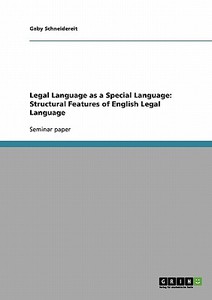
Legal Language as a Special Language: Structural Features of English Legal Language
Structural Features Of English Legal Language
- Editore:
GRIN Publishing
- EAN:
9783638654494
- ISBN:
3638654494
- Pagine:
- 28
- Formato:
- Paperback
- Lingua:
- Tedesco
Descrizione Legal Language as a Special Language: Structural Features of English Legal Language
Seminar paper from the year 2004 in the subject English Language and Literature Studies - Linguistics, grade: 1-, University of Dusseldorf "Heinrich Heine" (Anglistisches Institut), course: Domain Specific English Language - Language and Law, language: English, abstract: The English language has taken over the key role in international trade, legislation and policy-making. It has achieved "the enhanced status [¿] as the dominant world language [which] has led to an increased demand for the training of competent specialists able to mediate" (Alcaraz Varo/Hughes, 2002: 1). This goes along with a "phenomenal increase in the teaching of [¿] 'English for special (or specific) purposes' " (ibid.: 2). What is the reason for this development? This piece of work might give an answer; it dedicates itself to domain specific English language: language and law. It concentrates on the characteristics of the structure of legal English in particular. An overview of the central structural features is given, without claiming completeness. Legal professionals aim at a precise explanation of facts which should leave no doubts. This aim forces them to use a certain kind of language pattern, such as including a high amount of definitions in legal texts, along with numerous complex and ancient phrases deriving from Law French and plentiful enumerations which can all together form a single sentence covering several lines. Dependent on which party they represent, lawyers make frequent use of features that reduce the agent in his identity while emphasizing the action ¿ a matter of strategy which has the impeding of comprehension as a consequence. Therefore, the field of law becomes completely unapproachable for laymen, who are scarcely able to follow legal discourse. Even well-educated native speakers often find it hard to understand the language used in court. However, the access to one¿s rights is important. To begin with, the reader will be provided with an overall definition of special languages and an explanation why to regard them as a variety of a language; afterwards this will be illustrated at the example of the language of the law. Subsequently, the foundations for the structural analysis of legal English will have been laid. Language has to serve as the vehicle for transporting what the law is about. But legal language does not seem to be a good packaging of legal contents. That is why experts are asked to diminish the barrier and mediate between the language of the law and common speech. Does legalese function as an obstacle rather than a vehicle then? This question will have to be considered in this piece of work. Fußnoten: Alcaraz Varó, Enrique / Hughes, Brian (2002): Legal Translation Explained. (Manchester: St. Jerome). S.1f.



